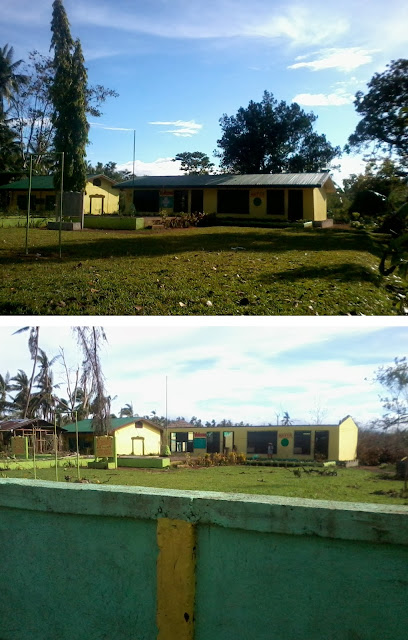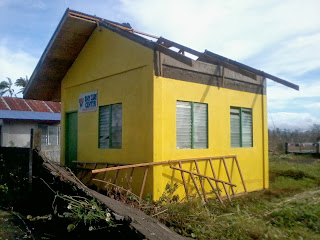Tunga and Barugo, Leyte were very serene and lively towns to stay at – people were very accommodating, place so laid back, food so abundant – until Hurricane Haiyan (Super Typhoon Yolanda) plagued the place.
We were not
aware of my relatives’ whereabouts after the super typhoon – there was no way
to communicate with them since all cell sites and power lines are down – until
one of my relatives was interviewed on TV last Nov 10. He was crying and asking
for help because they had nothing to eat for three days already.
Then and
there, my father contacted all our relatives in Manila and Cebu and asked for
help, either financial or in kind. They did send money which we used to buy
relief goods at SM.
To our
dismay, most of the relief goods at SM were sold out already including noodles
and brown sugar. We opted to buy other alternatives instead.
My father
decided that he will be the one to bring the goods and money to Leyte ALONE but
since there are rumors of people waiting for passengers to dock at the port armed
with knives, I decided to come along. (Acting brave? No, I just can’t stand the
idea of my father traveling alone, with that rumor spreading). My brothers who are policemen were on red
alert also that week so no one can go with him except me.
Tickets sold out, buses full
On the eve
of Nov 11, Cebu port was swarmed with people wanting to go to Leyte to come to
their relatives’ aid, volunteers of NGOs who offered their time and resources
to help and foreign reporters who came all the way to the Philippines to cover
the aftermath of the Hurricane. At the ticketing outlets, there were very long
queues and tickets were sold out.
We arrived
at Ormoc Port at 4:30am on Nov. 12. Rumors are not true; there were no armed people waiting at the port except for security personnel.
We had to travel 3 hours by bus to get to
our place in Tunga. There were motorists offering “pakyaw” for 250 each person but we opted to travel by bus since it
was more cost effective (P70 per person from Ormoc to Tunga). All buses have
reached their sitting capacity, so we had to stand for 3 hours with our goods
and bags in hand. We also had to make a few stops because there were cable
wires blocking the way.
We hadn’t
had breakfast until we got to Tunga at around 8am. From there, we had to travel
by foot for 30 minutes to get to our relatives’ houses (which was in the
interior baranggays).
Below are
pictures I have taken using my phone.
 |
| Fallen coconut trees block the way which made travel even slower |
 |
| Men who were deployed to clear the road for easy access |
 |
| majority of houses are either damaged or totally wiped out by the storm |
 |
| vegetation destroyed |
 |
| Trees are uprooted, cut or bent |
 |
| Tunga Municipal Hall after the Typhoon |
 |
| Cable wires used as clothesline |
 |
| Logs, roofs, electric posts, coconut or banana trees block the roads |
Tarps for roofs
When we
arrived, the place was almost deserted. Roofs and logs are where houses once
stood. My uncle’s family was staying in
their neighbor’s house which was also damaged. They just had to cover the
dilapidated house with tarp so they won’t be soaked when it rains.
 |
 |
| They had tarps for roofs |
 |
| Concrete wall dilapidated |
 |
| They had to rebuild their house |
Their things
are everywhere including the medals my cousins Searned which were once posted
on their wall.
 |
| Medals my cousins earned, which are now neglected |
Recovery in 3months, the least
I had spoken
with the newly-elected baranggay captain Josephine Piǹaranda. She does not know how and
where to start. Out of 178 houses, she said, only 36 are standing (their house
included) but are still damaged. The
captain was kind enough to let me sleep at their house during our two-day stay.
 |
| only 36 out of 178 houses left standing |
 |
| My other aunt's house, totally damaged |
Pagpanggot or getting wine out of coconut trees are their primary source of income in the baranggay but about 60% of the coconut trees were uprooted. Banana trees too. Most of the people who had rice fields were not able to harvest before the storm. In addition, relief goods have not reached the area. She estimates that in one or two months, if relief will not have reached the baranggay by then, they will be famished. “Hindi naman namatay sa bagyo, mamamatay naman sa gutom.”
There’s food
shortage already. “May pera nga, wala namang mabibili,” uttered Baranggay
Captain Piǹaranda.
 |
| Few families were able to harvest before the typhoon |
Electricity
will be back in 3 months, the least. She is not sure whether classes will
resume in December or January because even their schools were dilapidated.
 |
| Can-isak Elementary School before and after the typhoon |
 |
| Can-isak Day Care Center |
 |
| The river at Tunga before and after the typhoon |
 |
| 60% of coconut trees were either cut, or uprooted. |
She said there
will be exodus; people will have no choice but to go to Cebu and Manila to look
for jobs as house maids “kay mao rama’y
madali”.
NPA scare
On Nov 13,
while we were at my other aunt’s place in the neighboring town in Barugo, back in
Tunga there were rumors that the NPA has reached the place and was killing lots
of people. They were really scared to death; they hurriedly ran off to the
town’s social hall to seek refuge. When we came back, their faces are full of
fear and shock. My aunt narrated the story to us, shaking. “Bumagyo nalang ulit, wag lang NPA,” she said covering her
face full of tears.
Price hikes
When we got
to Tunga at around 8am on Nov 12, price of gasoline was still at PHP100 per
liter. At noon, it went up to PHP150 per liter; and at around 4 or 5pm, it went
up to PHP200. Bus transportation fees too, went up from PHP70 pesos (Tunga to
Ormoc and vice versa) to PHP200. We had no choice but to pay PHP400 for me and
my dad otherwise we can’t go home.
At Ormoc Port Terminal
In the morning
of Nov. 14, we arrived at the port of Ormoc. Again, tickets were already sold
out. What we fell in line for were not the tickets, but priority numbers for
the next day’s trips. Under the scorching heat of the sun, we fell in very long
queues just to get priority numbers. It rained suddenly, we were soaked; the
rain stopped and it was so hot again. But people were still; we did not care.
Rain or shine, we had to get priority numbers so we could go home the next day.
I started
falling in line at 9:30am for Weesam Shipping Lines. At 11, they stopped giving
priority numbers so those who fell in line for Weesam went to Supercat instead.
I was given priority numbers at 1pm. My number was 2243 and 2242 but Supercat
also stopped releasing tickets at priority number 520. So we had to wait again
the next day for our priority number to be called. Imagine the struggle.
We had to
spend the night at the terminal so we could fall in line early. We went on
shifts, in sleeping and even sitting because we only had one spot in one of the
benches in the terminal (the Supercat terminal; we stayed on the catwalk).
The next
day, unfortunately, priority numbers were not honored at some shipping lines.
Tickets were released on a first come first serve basis. Lucky for us, we fell in
line at 2:00 IN THE MORNING. We waited 8 hours and were able to secure tickets
at 10am. Again, we were lucky because we were one of the first 20 people in the
line who were given tickets. Others were given priority numbers for the next
day’s trip yet again since tickets were all sold out for that day– some of the
first ten people in the line purchased 30-50 tickets for their entire family so
the shipping line ran out of tickets easily. Most of them are from Tacloban who
were desperate to get to Cebu and start anew.
Words are not enough
Right now,
the media and the government are focused on Tacloban. But I call on the
government and other NGOs to reach out even further. There are interior towns
and baranggays that have not sought relief including Tunga and Barugo.
I am really
hoping that government authorities will have reached the isolated and rural
areas by tomorrow or today, if possible. Because, really, it means nothing to keep saying relief is coming if it is not
arriving.






















